How Should a Baby Look in a Car Seat
- How to Position a Newborn's Head in the Car Seat
Every new parent worries about the position of their newborn's head. Most parents are surprised to learn that what they thought was the best position may not be the best one!
This article draws on both The Car Seat Lady's knowledge as a child passenger safety instructor AND a pediatrician with 4 years experience working in a neonatal intensive care unit (NICU) putting hundreds of preemies and newborns into car seats.
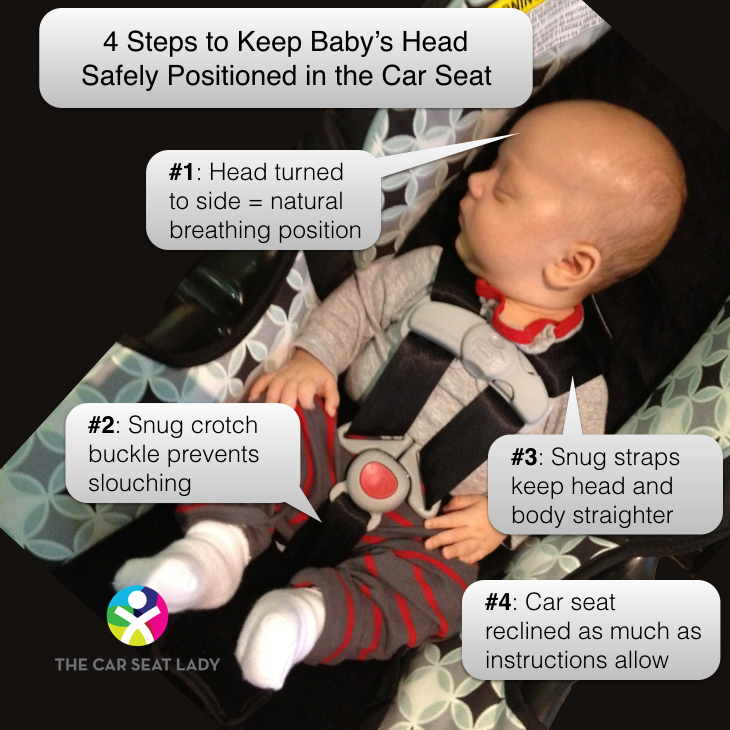
What is a good head position for a newborn?
Ever notice that when babies sleep in their cribs or bassinets, they usually have their heads turned to the side? The head turned to the side is a very natural position for breathing. Next time you hold a baby against your chest – or wear them in a carrier – notice how the baby's head naturally turns to the side. Here's a photo collage we made of many, many babies with their heads in this natural position.
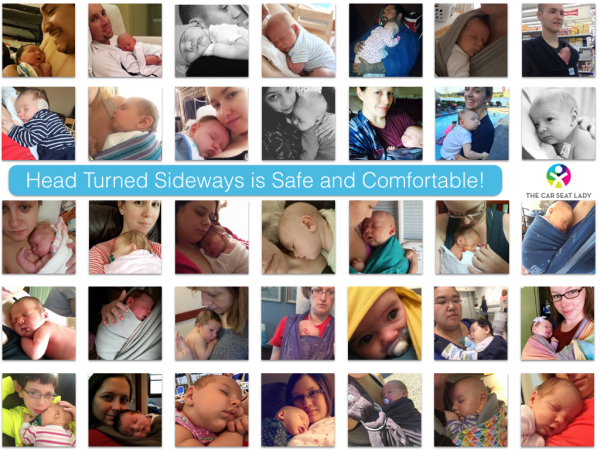
The head turned to the side is a very natural position for breathing.
No one worries when they see the baby's head turned to the side in the crib, or against an adult's chest… but many parents do worry when they see the baby's head turned to the side in the car seat. It makes no sense because the baby is laying on their back in both the crib and the car seat.
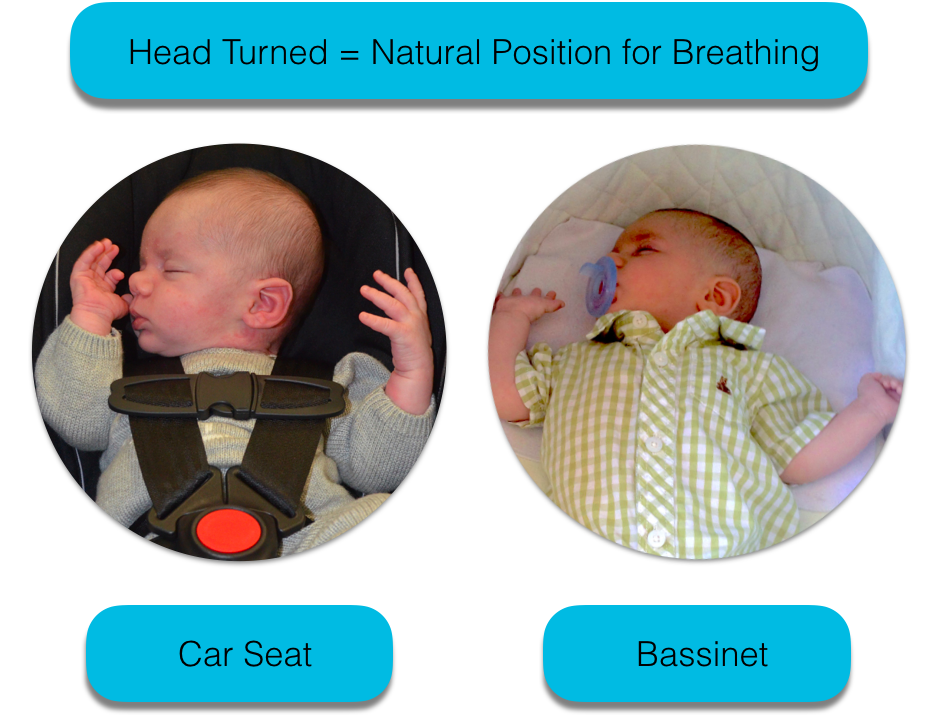
There's no need to reposition a head turned to the side–this can be unsafe!
When parents see their newborn's head turned to the side, many parents rush out to buy "infant head supports" which try to keep the head looking straight. Because these "supports" have tons of padding around and behind the head, they can actually push the baby's head down onto his chest, which is dangerous! (Note that the use of inserts that didn't come with the car seat also typically violates the car seat's instructions and can make baby less safe in a crash too.)
Why is it dangerous if the baby's head is pushed down to their chest? When your chin falls to your chest it's hard to breathe! Your chin actually blocks off your airway in this situation. Anyone who can sit upright unsupported can easily pick their head up off their chest to breathe more easily – so if your toddler sleeps in the car seat with his chin on his chest he'll be fine as he can pick his head up if he has trouble breathing, and so will you if you doze off in this position in the car. Because they can't sit upright unsupported, newborns can't pick their heads up, and the chin-to-chest position is a very dangerous one – it's dangerous in the car seat, the bouncy seat, the swing, the stroller, etc.
Many parents are surprised to learn that the head inserts that come in some infant seats – and in particular the head inserts sold separately – tend to make your baby's head MORE likely to fall into a chin-to-chest position because there is padding placed behind directly behind the baby's head.
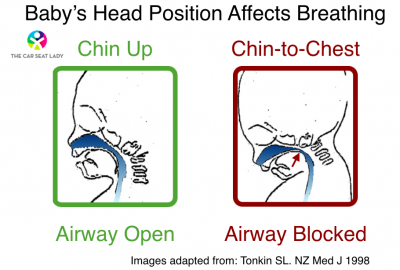
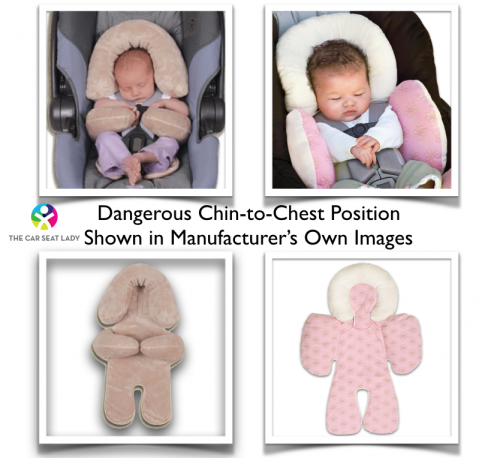
What about putting rolled burp clothes or receiving blankets around the baby's head?
If you feel like a preemie or newborn needs some extra support around the head to keep it from wobbling excessively, take 2 receiving blankets and roll them alongside the baby's entire body – and double them over at the head area. You want the blankets along the side of the body, not just around the head, to ensure the blankets stay in place and don't accidentally move behind the head where they could push the chin down.
Make sure the blankets are rolled firmly and that if the baby were to pull his head forward would not prevent the baby from putting his head back against the car seat.
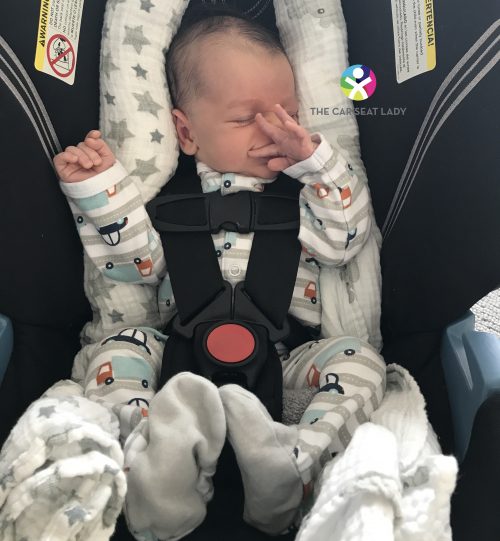
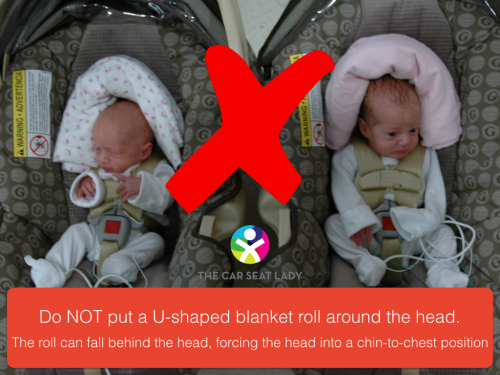
What about in a crash?
Many parents believe that the pillow-like inserts included with their baby's car seat (or the rolled receiving blanket or burp cloth a friend suggested they put alongside the baby's head) are there to keep the baby's head safe during a crash. Surprisingly, this is not the case. A receiving blanket or other type of soft object placed alongside the head will compress in a crash to a degree that it will not limit the motion of the baby's head and neck in a meaningful way. Limiting the motion of the head and neck must be done by a structural part of the car seat, like a built-in head restraint in the car seat that is close fitting to the child's head, as found on some car seats with no-rethread harnesses.
It's important to note here that rear-facing is the safest way to ride because it best cradles and supports the infant's head and neck during a crash. In a frontal crash, while the forward-facing kids and adults are being thrown forward – with their heads and necks being forcefully thrown forward away from their chests – the rear-facing child's head is cradled against the back of the car seat, much like a baseball catcher catching a fastball. In a side impact the rear-facing position is also more protective because instead of the head and neck being thrown out of the side wings of the forward-facing car seat as typically happens, the rear-facing car seat pivots towards the impact and the rear-facing child's head and neck stay better contained by the protective shell of the car seat.
How to keep your baby's head safely positioned
Follow these four steps (explained in detail just below):
- It's okay if the baby's head is turned to the side. This is a natural breathing position
- Make sure the crotch buckle is snug to prevent slouching
- Make sure the harness straps are snug to keep the baby's head and body straighter
- Recline the car seat as much as the instructions permit
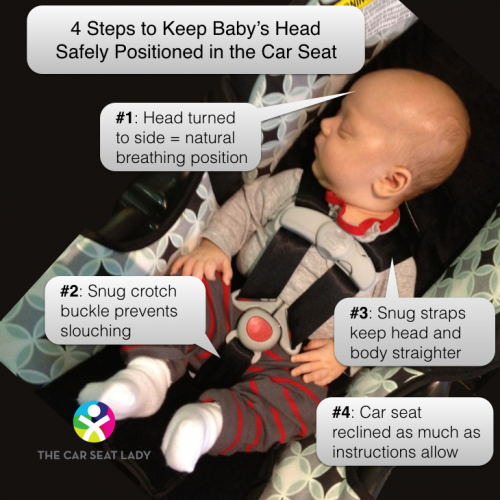
Step 1: Head Position
If your baby's head is turned to the side, great. If your baby's head is straight, that's great too. Just make sure the baby's head is not falling straight down into a chin to chest position.
Most infant car seats come with a removable insert behind the baby's head. If you find that the insert is pushing the baby's head forward, check the instruction manual and if you are allowed to remove it, we suggest taking it out.
If the car seat has a no-rethread harness – which is where there is a panel behind the child's head and back that moves up and down and pulls the shoulder straps higher or lower with it – you will NOT be able to remove this piece as it is a structural, and integral, part of your child's car seat.
Step 2: Crotch Buckle Position
The closer the crotch buckle is to the baby's bottom, the less the baby can slouch. Slouching is a problem because when the baby slouches, his head will fall down on his chest. If there is a significant gap between the crotch buckle and your baby's bottom, take a tightly rolled washcloth and AFTER the baby is buckled snug, place the washcloth in a U-shape along the baby's inner thighs to help fill in the gap.
Step 3: Snug Straps
Snug straps are crucial to keeping your baby's head in a safe position. If the straps are loosely buckled or unbuckled the baby can slouch or wiggle very easily into a position where their head falls down onto their chest and they can't pick it back up to breathe. Whenever your baby is in the car seat – even if it is "just in the house" – make sure the straps are fully buckled AND snug. Here's how to do it correctly.
Step 4: Recline the Car Seat
All infant car seats give a range for how upright and how reclined the baby can sit. However, the more upright ranges are often way too upright for a baby who can't sit upright unsupported. Therefore, we recommend installing your baby's car seat to the most reclined range allowed for that specific car seat.
How to Buckle Up Baby
Watch the video below to see how to buckle a newborn into a car seat and how to properly tighten the straps. Rewind the video to the beginning to watch about proper head position and dressing the baby properly for the car seat.
How Should a Baby Look in a Car Seat
Source: https://thecarseatlady.com/newbornheadposition/
0 Response to "How Should a Baby Look in a Car Seat"
Post a Comment